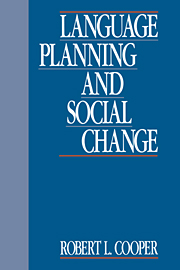Book contents
3 - The uses of frameworks
Published online by Cambridge University Press: 06 January 2010
Summary
Language-planning scholars face four tasks: (1) to describe, (2) predict, and (3) explain language-planning processes and outcomes in particular instances, and (4) to derive valid generalizations about these processes and outcomes. Accordingly, there are four criteria against which our success in carrying out these tasks can be judged: (1) descriptive adequacy, (2) predictive adequacy, (3) explanatory adequacy, and (4) theoretical adequacy, each criterion related to a different task. In the present chapter I argue that descriptive frameworks or accounting schemes help us not only to carry out these tasks but also to evaluate our success in doing so. In the next chapter, I present descriptive frameworks suggested by several disciplines or subdisciplines and apply them to language planning.
Descriptive adequacy
Descriptive adequacy refers to our success in representing what happened in a given instance. The scholar, confronted with this not inconsiderable task, faces two problems. (1) What should be described? (2) On what basis should the description be evaluated?
The first problem arises from the vast range of behaviors which could be described. What should be described? To what should we pay attention? With respect to my description of the founding of the Académie française, for example, what should I have included that I left out? What should I have excluded that I put in? Was it necessary to refer to events which took place in the century before the Academy's founding? Was it necessary to refer to Cardinal Richelieu's taste in art? Should I have described the composition of the first Academy? Should I have written less or more (and if more, what?) about Mme. de Rambouillet?
- Type
- Chapter
- Information
- Language Planning and Social Change , pp. 46 - 57Publisher: Cambridge University PressPrint publication year: 1990



